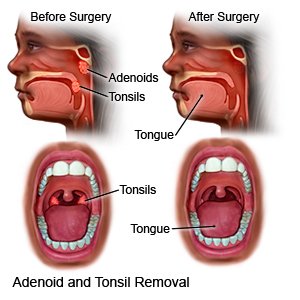Adenoidectomy
Medically reviewed by Drugs.com. Last updated on Aug 4, 2025.
What do I need to know about an adenoidectomy?
An adenoidectomy is surgery to remove your adenoids. Adenoids are located at the back of your nasal passage. They may need to be removed if they are enlarged or if they cause frequent infections.
 |
How do I prepare for an adenoidectomy?
- Your surgeon will talk to you about how to prepare for surgery. He or she may tell you not to eat or drink anything after midnight on the day of your surgery.
- Your surgeon will tell you which medicines to take or not take on the day of your surgery. He or she will tell you to stop taking aspirin 2 weeks before your surgery. You may be given an antibiotic through your IV to help prevent a bacterial infection.
- Arrange to have someone drive you home and stay with you after surgery.
Related medications
What will happen during an adenoidectomy?
- You will be given general anesthesia to keep you asleep and free from pain during surgery.
- Your healthcare provider will remove your adenoids through your mouth or nose. You will not have incisions or stitches.
What should I expect after an adenoidectomy?
- You may be able to go home the same day of your surgery.
- You may have a low-grade fever for 1 to 2 days after your surgery.
- You may snore or breathe through your mouth because of the swelling in your throat. Your breathing will return to normal after the swelling goes down.
- You should not bleed from your mouth or nose after you go home. If you start to bleed from your mouth or nose, contact your healthcare provider immediately. Do not blow your nose for 1 week after surgery, or as directed. You may have heavy bleeding if scabs fall off when you blow your nose.
- You may have bad breath that is caused by scabs that form where your adenoids were removed.
- The thick, white scabs will fall off in small pieces 5 to 10 days after surgery.
What are the risks of an adenoidectomy?
You may have swallowing problems, vomiting, fever, throat pain, and ear pain. You may get an infection.
Care Agreement
You have the right to help plan your care. Learn about your health condition and how it may be treated. Discuss treatment options with your healthcare providers to decide what care you want to receive. You always have the right to refuse treatment. The above information is an educational aid only. It is not intended as medical advice for individual conditions or treatments. Talk to your doctor, nurse or pharmacist before following any medical regimen to see if it is safe and effective for you.© Copyright Merative 2025 Information is for End User's use only and may not be sold, redistributed or otherwise used for commercial purposes.
Learn more about Adenoidectomy
Care guides
Further information
Always consult your healthcare provider to ensure the information displayed on this page applies to your personal circumstances.
